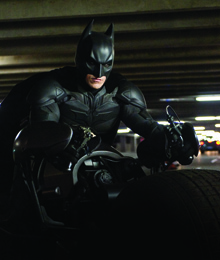Summer of Superheroes: The experts explain our fixation on fictional characters
August 1, 2012 by Michael Hill
Filed under Special Features

If you make yourself more than just a man, if you devote yourself to an ideal and they can’t stop you, then you become something else entirely. A legend, Mr. Wayne. – Ra’s al Ghul, Batman Begins, 2005.
This line, so eloquently delivered by Liam Neeson in Christopher Nolan’s Batman Begins, the 2005 reboot of the Batman film franchise, is the existential nudge directing a once lost and disillusioned Bruce Wayne down the path towards dark knighthood — a storyline that wrapped up this July in the highly anticipated blockbuster The Dark Knight Rises.
It was the simple yet powerful push Wayne needed. Like a forest being born again in the aftermath of wildfire, this counsel guided his gaze to the set of ideals that could, if embraced, grow from tragedy. Principles that are put to the test when al Ghul places a blade in the young billionaire’s hand, ordering him to execute an alleged murder.
Wayne, however, refuses. He makes a choice to hold true to his newfound beliefs, even when faced with death. It was a defining decision. He may not have realized it then, but at that moment, Batman was born. He didn’t have a face. He didn’t have a name. But in Wayne’s rejection to take another’s life, like the thug who robbed him of his parents, a hero emerged.
This summer, movie screens across the globe are igniting with the electrifying tales of similar caped and capeless crusaders who, like the youthful Wayne, stand for truth, justice and all that other stuff. For decades, flocks of eager moviegoers have packed theatres to witness the high-flying, action-packed adventures of these legendary icons, and this year will be no different. Yes, with The Avengers, Spider-Man and, of course, Batman all making their way to the big screen — many for the umpteenth time — 2012 is another summer of superheroes.
Which begs the question: Why do we love these power-wielding, spandex-rocking heroes? “One of the things is that, I think, they remind us of our youth,” says Dr. Robin S. Rosenberg, a clinical psychologist, author, and editor of The Psychology of Superheroes, a collection of essays examining the mind-sets of these masked protagonists. Rosenberg explains that because superheroes are so deeply ingrained within our culture, these super-powered films resurrect fond childhood memories. Nights flipping through comics by flashlight; sitting in our pyjamas on Saturday morning cheering for our favourite crime fighters as they duke it out with the
week’s up-to-no-good evildoer — today’s films breathe life back into those innocent moments of simpler times. It’s pure nostalgia. “I think that’s a really powerful experience for people,”
she says.
The roots certainly do run deep. Batman was first introduced to audiences in 1939. Superman: 1938. Spider-Man, with this summer’s The Amazing Spider-Man reboot, swung onto the scene in 1962. And The Avengers — which made serious buck at the box office, raking in nearly $1.5 billion worldwide — first assembled back in 1961.
From action figures to T-shirts to films to TV shows to video games and whatever other merchandise they can be slapped on, superheroes are heavily intertwined in our cultural landscape. They’re practically institutions. But it must be more than just sentimentality that summons us to theatres like a Bat-Signal glowing in the black of night. “Each character has something really interesting that resonates with how you feel as a person at that time,” says Canadian comic book artist Marcus To. “The base of all characters [is that] they’re in real-life situations, even when it’s packaged in very unrealistic ways,” he adds.
To, who is currently working on the DC series Batwing, explains that while the powers are cool and the action is exhilarating, the characters that grace the pages of graphic novels, movie screens and television sets still face the same problems as everyday individuals. Peter Parker still struggles with high school drama, the mutants of X-Men, who are shunned by society because of their differences, crave acceptance (like any kid), and Superman, a literal alien, must hide his gifts to fit in with humanity. “Who doesn’t feel like an alien sometimes?” says To, who also formerly worked on DC’s Red Robin.
While superhuman, superheroes are still very much human. Perhaps not always in the biological sense, but on an emotional level, they’re just as human as their readers, and thus relatable. And besides, as To explains, their powers are not even the focus. They may be the initial draw, but what keeps us in our seats is the human part of the story, and “how they deal with something spectacular happening to them,” he says. Their powers are only tools. It’s what heroes do with those tools that count; the choices they make with the gifts they’re given.
When Spider-Man initially uses his arachnid-like abilities for selfish reasons, it results in the death of his uncle Ben. With great powers comes great responsibility, and Spidey learns it the hard way. When Bruce Wayne’s parents were slain, he chooses to never be an executioner, no matter how grave the crime — a righteous pledge that’s been tested time and time again.
Indeed, these superhero stories illustrate how individuals can rise from traumatic events. “How to make meaning from tragedy, but also how to survive and live a noble life of purpose; that having a life of purpose and mission is incredibly rewarding, although it involves sacrifices,” says Rosenberg, whose latest book, What’s the Matter with Batman? An Unauthorized Clinical Look Under the Mask of the Caped Crusader, was released this June. “And I think for many people, that is absolutely a message they are hungering for.”
Superheroes act as a super-powered mirror, and Rosenberg points to real-life heroes who have also risen from tragedy. Mothers Against Drunk Driving resulted from the deaths of loved ones, The Guardian Angels began patrolling New York City streets and subway stations after crime ran rampant, and John Walsh took the reins of America’s Most Wanted after the kidnapping and murder of his son. All these parties took the heart-breaking hand they were dealt with and made it into something more: a mission that has since inspired countless others.
In the end, isn’t that what we’re all looking for, to be inspired? In the face of seemingly insurmountable odds, when confronted by the greatest evils or left in the deepest of holes, superheroes rise to the occasion, holding true to their ideals, refusing to give up on humanity and inspiring hope even in the darkest hours. Like that youthful Bruce Wayne when his principles hung in the balance. “Endure, Master Wayne,” says Alfred in The Dark Knight. “Take it. They’ll hate you for it, but that’s the point of Batman, he can be the outcast. He can make the choice that no one else can make, the right choice.” They may not always walk away unscathed, but superheroes demonstrate that evil can be overcome, and that the potential to be a symbol of hope resides within us all. We just have to make a choice.













Comments
Feel free to leave a comment...
and oh, if you want a pic to show with your comment, go get a gravatar!